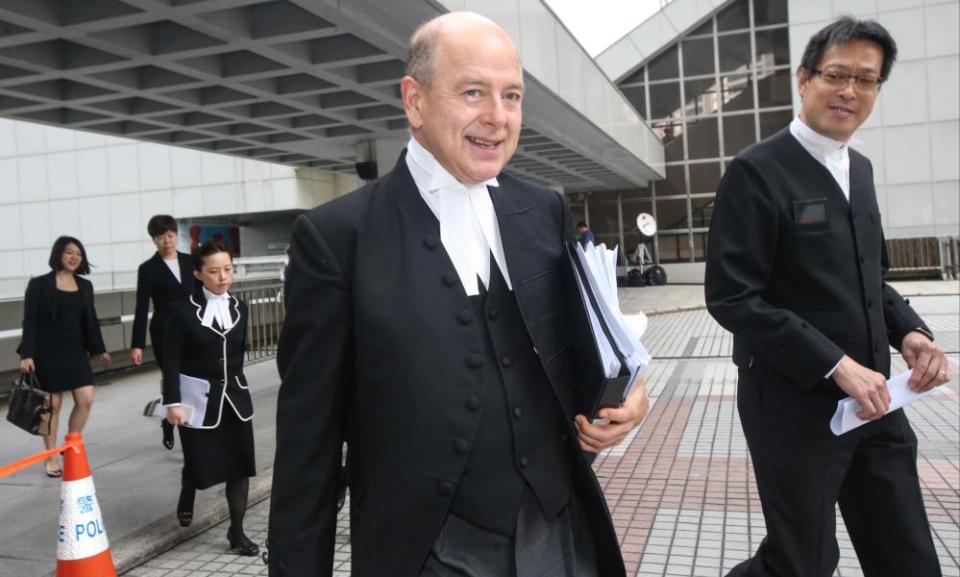British QC prosecuting activists in Hong Kong fought to be allowed to take case

David Perry, the British QC under fire for agreeing to prosecute pro-democracy activists in Hong Kong, had to go to court himself to win permission to take the controversial case.
The nine activists facing a potential seven-year jail sentence for alleged unlawful assembly in 2019 include Jimmy Lai, the independently minded newspaper proprietor, and Martin Lee, the so-called father of Hong Kong democracy.
Perry has so far refused to comment on why he took the case.
If the defendants lose, the courts have already declared that the Hong Kong commissioner of police would have greater powers to restrict freedom of peaceful assembly.
Perry’s defenders are claiming he is acting under the “cab rank” principle that requires him as a part-time member of the Hong Kong bar to take cases if so required. He has previously acted in a number of high-profile cases in Hong Kong.
But Perry had himself to go to court in the first instance to gain permission to fly out to take the case after the local Hong Kong bar association protested against the justice department’s decision to hire the QC at considerable expense, saying no attempt was made to hire local barristers.
Charlie Falconer, the British shadow attorney general, said: “David Perry is a very respected practitioner, but the cab rank principle does not apply to foreign cases. He had to apply to take this case in Hong Kong over the objections of the Hong Kong bar. It’s his choice and he has made the wrong choice.”
The Labour peer and human rights lawyer Lady Helena Kennedy said: “The truth is that we are not hired guns. We are not mercenaries that take a brief that might involve the erosion of the rule of law. The purpose of that rule [the cab rank rule] is to make sure no one goes unrepresented, that we make sure that justice to the best of all possibilities is represented in the court. That is not the situation here.”
She added: “A member of the English bar should be very careful about going to China and acting on behalf of the state in order to prosecute people under really questionable law that was produced at the behest of China and when the consequences could be very serious in terms of individual liberty of those involved.”
The UK barrister’s code of conduct disregards the cab rank principle for foreign work, but Perry is registered with the Hong Kong Bar Association so it is arguable the cab rank principle applies to him as used by the Hong Kong bar.
The nine are not being prosecuted under the new security act imposed by the Chinese government last summer but under pre-existing legislation that eight of the defendants claim is being abused to prevent lawful assemblies. The defendants had permission to hold an assembly in August 2019, but the police commissioner claims they breached the order by allowing the demonstration to leave Victoria Park. The defendants claim the commissioner overstepped his powers to restrict demonstrations.
In a bid to block Perry’s application to appear in the case, Jonathan Chang, counsel for the Hong Kong bar, told the court: “No effort has been made to engage local leading counsel at all. The legal issues said to be involved in the trial are not of unusual difficulty or complexity. The applicant is unlikely to add significant dimension to the trial or the resolution of the legal issues said to be involved.”
The court ruled Perry’s involvement was justifiable since great constitutional issues would be resolved concerning the right of the commissioner of the police to restrict freedom of assembly.
The Labour MP Barry Sheerman expressed disbelief that a British barrister should seek to prosecute pro-democracy demonstrators.
Other critics include Oliver Lewis, a barrister at Doughty Street Chambers, who accused Perry of “bringing the bar into disrepute” by prosecuting offences “under a law that has been condemned by international human rights bodies”.
However, Marc Beaumont, a barrister who specialises in disciplinary proceedings, said counsel did not and could not judge morality.
“It is not for a barrister to judge the moral values of his own client,” he said. “If it was open to a barrister to do that, he would never act for a serial criminal, someone accused of a particularly horrific murder or series of murders, or even a clearly guilty and notorious war criminal such as one of the defendants at the Nuremberg trials.”
A fierce debate at the highest level of the UK government has been raging for months about the wisdom of British judges continuing to serve on a non-permanent basis on the Hong Kong court of final appeal. There are 14 overseas non-permanent judges working in Hong Kong, including 10 from the UK led by Lady Hale and Lord Sumption. Some have expressed their own misgivings about serving on the Hong Kong bench.
Some in the government, including senior figures in the Foreign Office, argue such judges are now fatally compromised owing to changes in the law. Others, particularly among law officers, say that the law, including the involvement of British lawyers, provides one last source of British influence over liberty in Hong Kong. There is increasing pressure from Beijing on the legal system, with pro-China legislators demanding that prosecutors be allowed to tell judges what level of punishment should be imposed. They are also calling for a review of the sentencing guidelines.
The new security law allows judges to be removed from their post if they make “any statement or behave in any manner endangering national security during the term in office”.

 Yahoo Finance
Yahoo Finance 